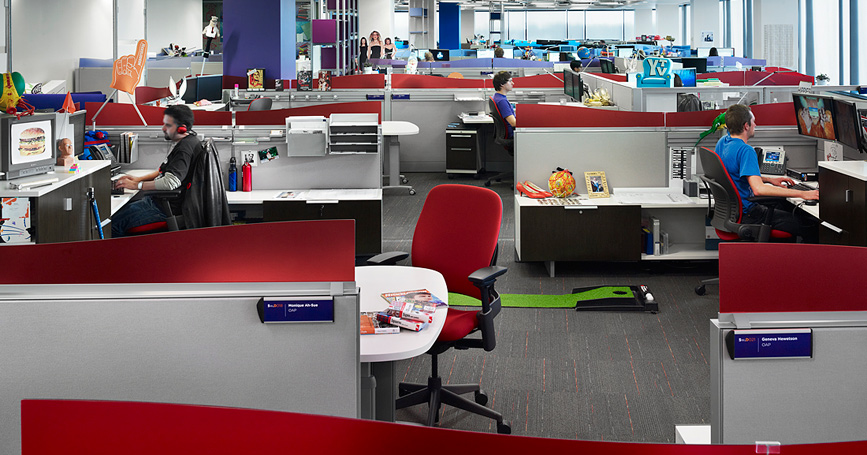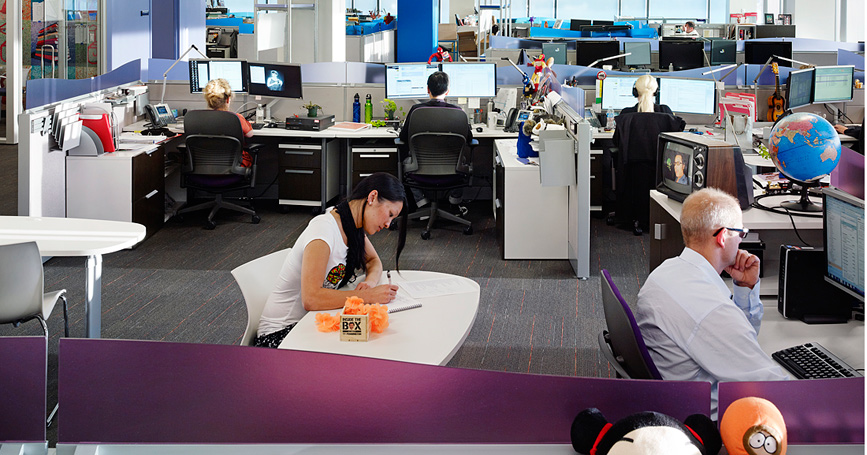The Response
Corus noted that the decision to specify Teknion furniture was highly influenced by Teknion’s commitment to sustainable business practices and the green attributes of Teknion products — e.g., low-emitting materials and finishes and the option of FSC® certified wood in panels, worksurfaces and storage doors. Teknion’s Canadian origin and the Toronto location of manufacturing facilities also helped Corus reach the decision to choose Teknion.
Teknion partnered with the Quadrangle design team to create a standard kit of parts. Altos and Optos architectural walls were used strategically and customized for each brand. Teknion and 3Form manufactured colorful wave acrylic blades that topped Leverage panels. Ranging from bright red to lime green, the acrylic screens create a visually dynamic space, identify departments and, at a height of 42 inches, provide privacy while maintaining openness and views. Even mobile pedestals received a custom touch with a Quadrangle-designed fabric derived from the Corus logo. The workplace is full of original, sophisticated thinking about how design can build an engaging and energizing workplace.
Corus leadership and the design team consulted employees about design and respected the desire for individual expression. People had the opportunity to select one of two versions of the basic workstations — a storage cabinet or a small meeting table with guest chair to suit the individual workstyle. Employees could also personalize their space with Teknion’s Complements workflow accessories available through an online tool created by Teknion. Although workstations differed to a degree in dimensions and materials, all were low and open, including that of the CEO. There are no private offices anywhere in the building.
“This is a building without offices,” says Quadrangle Principal Brian Curtner. “The design concept was based on a commitment to openness and communication—and Teknion really helped us achieve that goal. The new space reflects the essence of the Corus brand —unconventional, but sophisticated. The Teknion team was quick to understand the corporate culture at Corus, and how we were designing the workplace to respond creatively.
Lesson Learned
A lesson learned was the importance of considering the choice of furniture not only in the context of the physical space, but also within the context of the corporate culture. Furniture not only supports workflow, it can spark performance and innovation. Likewise, the Corus building has been heralded as one that engages its staff, allowing them to work how and where they feel most comfortable. The building animates an under-utilized neighborhood and acts as a catalyst for further development along the East Bayfront of the Toronto waterfront.
Lead Interior Designer Caroline Robbie says, “Corus Quay is a result of all the best thinking around how design can improve how people work. The space is full of light, views and color. This is made possible in part, by Teknion products like Optos glass walls and the color-topped low workstations. It has been great to collaborate with a furniture company that really understands workplace design like Teknion.”

Ranging from bright red to lime green, the acrylic screens create a visually dynamic space, identify departments and, at a height of 42 inches, provide privacy while maintaining openness and views.

Although workstations differed to a degree in dimensions and materials, all were low and open, including that of the CEO. There are no private offices anywhere in the building..